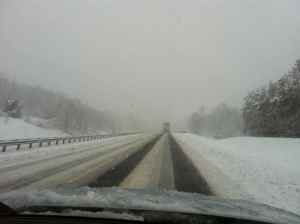Last Friday, Mother Nature decided to play her own April Fools joke on much of the Northeast: a snowstorm. I live in Portland, ME, which is a 45 minute commute to Bates College. If it weren’t for a brave friend who gave me a ride, I would not have made it to work, and therefore, not been able to teach my classes. (See the picture below for a testament of just how brave my friend is.) In fact, two blizzards this Winter semester kept me from getting to Bates, and in both cases I had to cancel class.
Many of you might not live in a place where blizzards or snowstorms keep you from getting to work, and many of you who do might be more practical than I and live in walking distance from your jobs. But something unexpected might still happen and you might not be able to get to work. For example, one time last Fall I almost hit a deer driving home (and hit the guardrail instead), and had to miss the next day’s lecture (I was fine but had to deal with a car rental and was too late to class to teach it)*. In this post, I want to share the lessons I learned about planning for emergencies (weather related or not) and hope to start a useful discussion on this topic.
The first storm happened on the first week of class of the Winter semester. Needless to say, I was not yet prepared for any contingencies. Colleges in Maine don’t really have snow days, I learned. Especially colleges in which all the students and most of the faculty live on campus or in walking distance from campus. There was not enough time to find a substitute, but I did ask a colleague who lives near campus to come in and talk to my Calculus students about a worksheet they had been working on. I had to cancel my Stats class, though. I gave them a reading assignment and a couple of homework problems based on the reading, but it would have been better to have some worksheet-type problems on the back burner so that someone could sub for me without having to give a lecture. However, one missed class is not a huge deal and I readjusted my semester plan accordingly.
When the second storm came, I was ready. Or so I thought. I packed an overnight bag and planned on staying with a friend who lives close by. The next morning, I saw the blizzard. I realized I didn’t even feel safe driving the 10 miles that separated my friend’s house from the college, so I was stuck away from work. Again. This time, I was planning on giving quizzes. I give quizzes every other day in all three of my classes, instead of collecting homework. The quizzes are supposed to be exactly problems from the homework (so this way I make sure they’re keeping up with the material**.) I got into the pattern of writing each quiz right before class. So I had not written the quiz, and I did not have the book with me (and apparently, it’s nowhere to be found on the internet). Having your class take a quiz even though you’re not there would definitely work out (as long as you find someone to proctor), so it was a shame that I couldn’t write it. So now I always take the textbooks home with me.
A few more snowstorms happened, but none so bad that I couldn’t get to work. And I also came to what is perhaps the most important realization: carpool with someone who has four-wheel drive and the courage to drive through these awful storms. And that’s how I was able to make it to work on April Fools day.
But I guess the real moral of this story is: plan, plan, plan. Have plenty of problems that could become a useful worksheet or homework assignment. Have lectures and quizzes prepared far enough in advance that someone can step up and sub without going through too much trouble. Have a place to stay or someone to drive with in case of bad weather, car trouble, etc. Of course, it is also important to accept that some things you just cannot plan for, and it’s not the end of the world. The students are probably happy to get the day off, anyway.
Any ideas on other contingency plans, or how you’ve dealt with emergencies successfully?
* I like to call this incident “the day I ate meat and a deer tried to kill me.”
** You may be wondering how this has worked out and how it compares to collecting homework. But that is another story and shall be told another time.


A colleague of mine, when he travels to conferences and such, “records” his lectures using a Bamboo tablet. More specifically, he makes a video which records what he writes down and what he says. You can’t see him, but you can hear him and see what he is doing. This seems like it could be effective in a pinch, and easily done from home and posted somewhere that students could see it.
This is one major benefit to being a grad student. 99% of the time all I have to do is give a shout out to my fellow instructors and someone can step in on short notice who has taught that lesson possibly another time already that day!